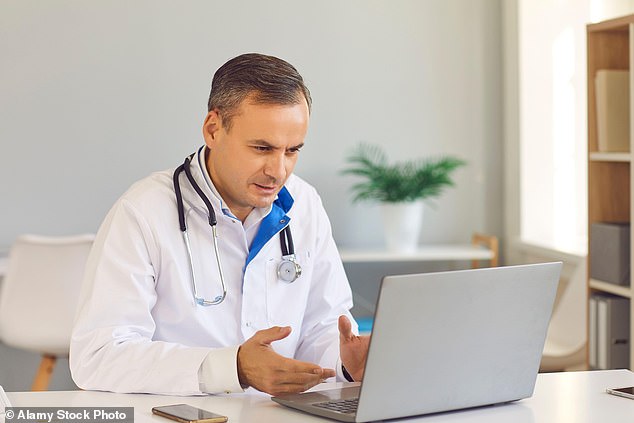The doctor will Zoom you now! Patients speak to their GP online or in a video chat for a record one in 50 appointments
Patients now speak to their GP online or via video chat, for a record one in 50 appointments.
Of the approximately 28 million GP appointments in England in August, almost 600,000 were made online or via video call.
This amounts to 2.1 percent of appointments, which amounts to approximately one in 50 consultations.
According to the PA news agency’s analysis of NHS data, the rate is up from 1.8 percent in July – and the highest rate of appointments since current records began in November 2017.
The figures only relate to online appointments and do not include the high proportion of GP appointments (about a quarter) that are made by telephone.
Of the approximately 28 million GP appointments in England in August, almost 600,000 were made online or via video call (Stock Image)
But they also help explain the decline in in-person appointments even after the pandemic, which saw in-person consultations fall to record lows.
Patient advocates fear symptoms may be missed if people are not seen in person by their doctor, and say some older people may struggle with online and video technology, raising concerns about an increase in these types of consultations.
Dennis Reed of Silver Voices, which campaigns for older patients, said: ‘We are receiving increasing reports of people being essentially forced to make virtual appointments online, and not even being able to get a phone call to their doctor.
‘That is extremely worrying, because many older people find this technology very difficult to use, even though they did not grow up with the internet and did not use it in their work.
‘People don’t have to be technical experts to be able to talk to their GP.
‘Large parts of the population are at risk of falling behind, and their health may suffer.
‘Face-to-face appointments are best, and online will always be a second-line appointment, where symptoms can be missed when described over the internet.’
The increase in the number of appointments via the internet or via video call is accompanied by a decline in the number of face-to-face appointments, which fell from 70 percent of appointments in April to 67.9 percent in August – the lowest figure in twelve months.
About 26.5 percent of appointments in August were made over the telephone, while one percent were home visits, with these figures having changed little in recent months.

Patients now speak to their GP online or via video chat for a record one in 50 appointments (Stock Image)
Speaking on behalf of the Rebuild General Practice campaign, Oxfordshire GP Rachel Ward said: ‘Video appointments are best for many patients who tell us they like the flexibility and efficiency, while other patients prefer to come to us.’
She added: “We want to be able to see our patients and provide the care they need, but the system is broken.
‘Decades of neglect across the healthcare system and especially in general practice have compromised patient safety.
‘That’s why we’re asking for a good plan to invest in general practice and help us provide the service patients deserve.’
Dr. Victoria Tzortziou Brown, vice-president of the Royal College of General Practitioners, said: ‘We know that some patients prefer to see their GP in person, and many GPs prefer this method of consultation, but some patients find remote care a convenient option. and effective way. of access to GP services.’
Under NHS England guidance, GP practices must respect patients’ preferences for a face-to-face appointment unless there are good clinical reasons not to do so.
An NHS spokesperson said: ‘GP teams have experienced record demand for their services, with half a million more appointments every week than before the pandemic, and almost seven in ten appointments took place face-to-face in August.
‘The NHS is committed to improving access for patients. That’s why we published our primary care access recovery plan in May, which included ground-breaking support for patients and GP practices.”
